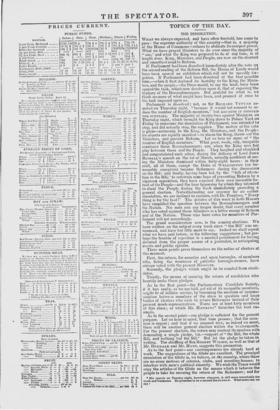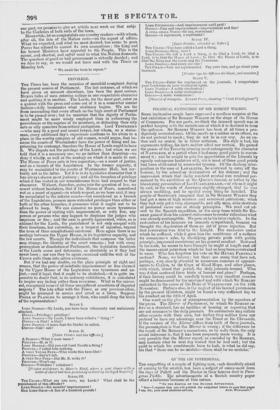TOPICS OF THE DAY.
THE DISSOLUTION.
WHAT we always expected, and have often foretold, has come to pass : the supreme authority of this country-that is, a majority of the House of Commons-refuses to abdicate its usurped power. What we have prayed Ministers to do ever since they majority of " one," and what the King was prepared to do at any time, is at length done. King, Ministers, and People, are now on the shortest and smoothest road to Reform.
If Parliament had been dissolved immediately after the vote on the second reading of the Reform Bill, the House of Lords would have been spared an exhibition which will not be speedily for- gotten. If Parliament had been dissolved at the best possible time,-when it first declared its hostility to the King, the Minis- ters, and the people,-the Press would, to say the least, have been spared the task, which now devolves upon it, that of exposing the trickery of the Boroughmongers. But grateful for what is, we think no more of what might have been, and proceed at once to the task imposed upon us.
Parliament is dissolved ; not, as Sir RICHARD VYVYAN as- serted on Thursday night, " because it would not consent to re- duce the number of English members," but BECAUSE IT STOPPED THE SUPPLIES. The majority of twenty-two against Ministers on Thursday night, which brought the King down to Palace Yard on Friday to announce the dissolution of Parliament, was intended to stop, and did actually stop, the supplies. The motive of the vote is plain-animosity to the King, the Ministers, and the People: its objects are equally manifest-to alarm the King, throw out the Ministers, and prevent Reform. Let us hear no more of " the number of English members." What poor, weak, silly, incapable creatures these Boroughmongers are, when the King sees fair play between them and the People. They laughed and chuckled and congratulated each other, during the delivery of Lord JOHN RUSSELL'S speech on the 1st of March, actually confident of see- ing the Ministers dismissed within forty-eight hours : in their craft, all of them, except the Duke of WELLINGTON (an ho- nourable exception) became Reformers during the discussions on the Bill: and finally, having been led, by the " talk of altera- tion in the Bill," to entertain some hope of preventing Reform by a vigorous opposition, they have exposed their own incurable ha- tred of the People-and the base hypocrisy by which they intended to cheat the People during the week immediately preceding a general election. Notwithstanding our urgency for an earlier dissolution, we are inclined to exclaim, with Dr. Pangloss, " Every thing is for the best !" The debates of this week in both Houses have simplified the question between the Boroughmongers and the Nation. No man can any longer doubt, that every member who has voted against these Ministers is a bitter enemy of Reform and of the Nation. Those who have votes for members of Par- liament will act accordingly.
The grand consideration now, is the coming elections. We have written on the subject every week since " the Bill" was an- nounced, and have but little more to say. Indeed we shall repeat what we have said before, in the following suggestions ; but per- haps the trouble of repetition is a merited punishment for having deviated from the proper course of a journalist, in anticipating events and public opinion. Three main points press themselves on the notice of electors at this moment.
First, the return, for counties and open boroughs, of members who, being the nominees of patriotic borough-owners, have always voted with the present Ministers.
Secondly, the pledges which ought to be exacted from candi- dates.
Thirdly, the means of securing the return of candidates who heartily make those pledges.
As to the first point-the Parliamentary Candidate Society, if it has really, as we are told, got rid of its incapable members, might be of infinite service, by becoming the medium of commu- nication between members of the class in question and large bodies of electors who wish to return Reformers instead of their present mock-representatives. There are at least forty members of this class ; of which Mr. HAWKINS* furnishes the best ex- ample.
As to the second point-one pledge is sufficient for the present purpose. Let us bear in mind, that time presses ; that the occa- sion is urgent ; and that if we succeed now, as indeed we must, there will be another general election within the twelvemonth. For the present election, the_voters may content themselves with demanding a single pledge, viz.-support of " the Bill, the whole Bill, and nothing but the Bill." But let the pledge be taken in writing. The shmuffling of SIR ROBERT WILSON, as well as that of Mr. elIGDALE and Mr. HUNT, suggests this precaution. As to the last point-our contemporaries are already hard at work. The suggestions of the Globe are excellent. _The principal circulation of the Globe is, we believe, in the country; where there are no cross motives of coteries, clubs, and counting-houses, to interfere with men's political sincerity. We wish the Times would copy the articles of the Globe on the means which it behoves the people to take for securing the return of the Reformers; and for • His speech on Tuesday night, however eloquent, is still more remarkable for truth and frankness. He promises to be a second Ba OUGUA.X. What more can we say our part, we promise to give an article next week on that mil* to the Cocknies of both ends of the town. Meanwhile, let us congratulate our country readers—with whom, after all, the fate of the Nation rests—on the aspect of affairs. What we expected, and what we most desired, has come to pass. Power has refused to correct its own usurpations ; the King and his honest Ministers have appealed to the People. This is the surest, and shortest, and safest road to what the Nation demands. The question of good or bad government is virtually decided ; and we dare to say, as we would not have said with the Times on Monday last, " We await the issue in repose."



























 Previous page
Previous page